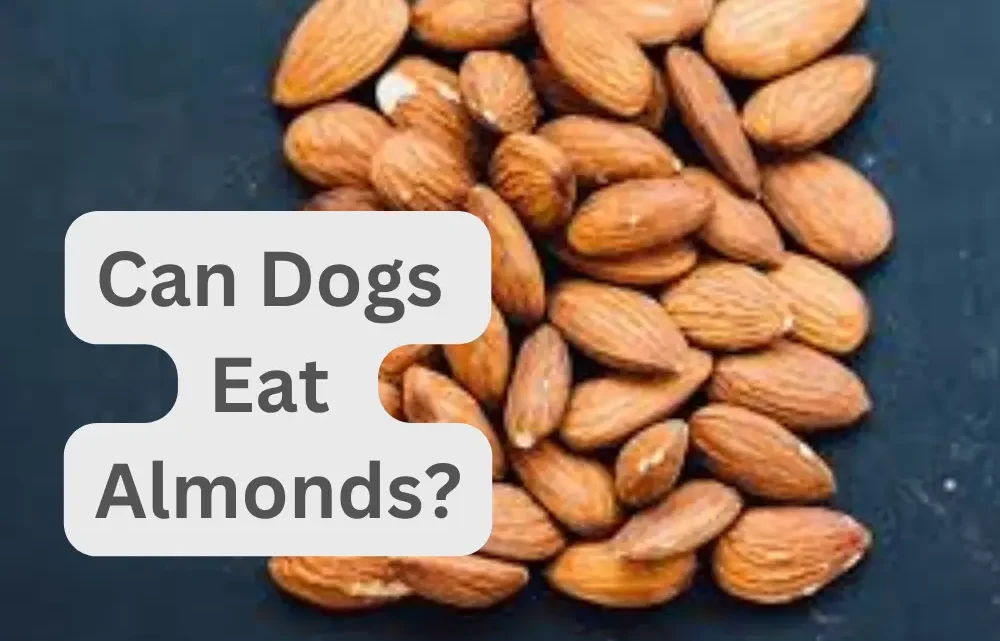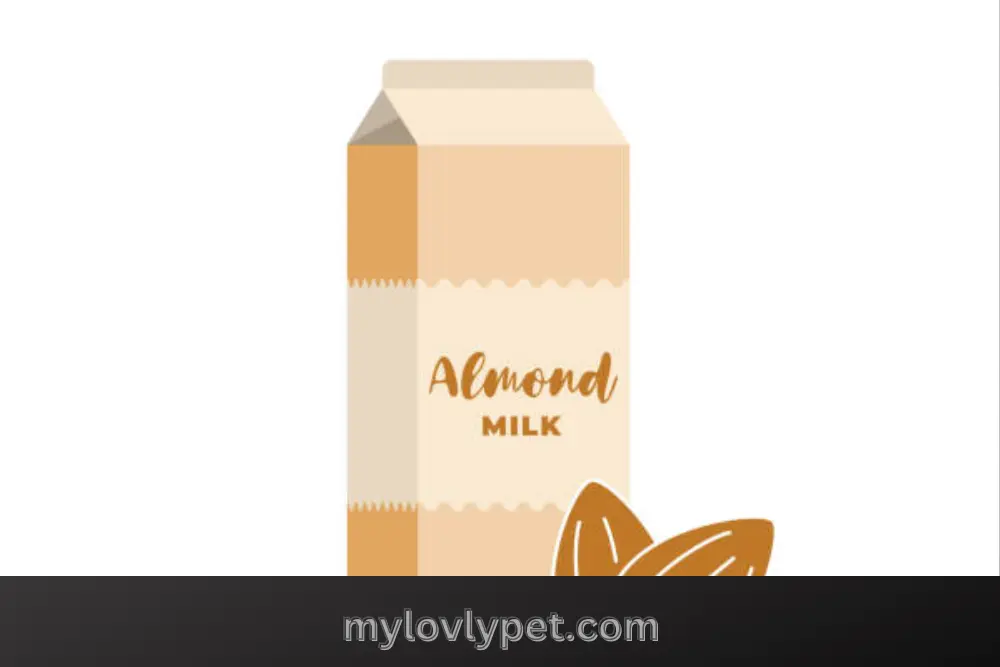
Can Dogs Eat Almonds What are Benefits and Risks?
Can dogs eat almonds? In a nutshell, yes. But there are a few considerations.
As a first step, remember that almonds are high in fat and should be used moderately. All nuts are heavy in fat and calories, so giving your dog too many of them might cause weight gain.
Almonds may also trigger an allergic reaction in some dogs. You should consult your vet immediately if your dog exhibits any out-of-the-ordinary behavior after eating almonds or any other food. So, in general, almonds are safe for dogs to eat, but you should be careful when giving them to your dog.
Can Dogs Eat Almonds Safely?

Almonds are completely safe for dogs to ingest. The truth is that they’re a nutritious and healthful treat that can improve your dog’s overall health in many ways. Almonds are rich in protein, fiber, vitamin E, magnesium, and manganese.
They contain a fair quantity of calcium, phosphorus, and potassium. Each of these vitamins and minerals is crucial to your dog’s well-being. Your dog needs protein for healthy muscle tissue, organs, and a strong immune system.
Their digestive tract is kept in good working order by the fiber. The powerful antioxidant properties of vitamin E can aid in keeping your dog healthy. Moreover, the magnesium and manganese in your dog’s diet are essential for his body to perform hundreds of biochemical processes.
Almonds are a healthy and delicious option if you’re looking to treat your dog. They are high in calories, so it’s best not to give them too many all at once. Just a couple will do!
Can Dogs Eat Almonds Possible Health Risks
Although almonds have several health benefits for humans, like being high in magnesium, low in sodium, and a good source of vitamin E, the risks of giving them to your pet outweigh the benefits.
Although properly processed almonds are not immediately hazardous to your dog, the protein in nuts is not easily digested by their digestive system. Some of the risks related to dogs and almonds are listed below.
Indigestion
Larger dogs like Labradors usually have no difficulty digesting a handful of almonds, but smaller dogs and pups could have a life-threatening intestine obstruction. If your dog or cat consumes almonds, you may find nut pieces in their poop, along with blood.
Risk of choking
Almonds are a choking threat since dogs rarely chew their food. Almonds pose a serious health risk when ingested whole, especially to toy breeds and young puppies, because they can become lodged in the esophagus or windpipe.
Allergies
If your dog has a nut allergy, even a small amount of almond could be dangerous. Check out for allergy symptoms like coughing, sneezing, trouble breathing, and hives. See a veterinarian immediately if you observe any of these symptoms.
The Retention of Fluids
Almonds are a dog’s favorite, especially flavored ones like cinnamon, smoked, and BBQ. The issue is that many commercially packaged nut products are quite salty, which can lead to excessive fluid retention and an overly thirsty pet. When a dog has cardiac problems, fluid retention is extremely harmful because of the strain it puts on the heart and kidneys. Salt poisoning can also occur from eating too many pre-packaged almonds. As a last point, flavored almonds have artificial tastes and other bad ingredients for your dog’s health.
Stones in the Bladder and Kidneys
Because of their high phosphorus content, almonds may increase the likelihood of developing kidney and bladder stones. Furthermore, the bladder may rupture if the obstruction is not removed, which can be dangerous if not addressed quickly. Breeds, including the Dachshund, Pug, Bulldog, and Beagle, are predisposed to developing bladder stones.
Pancreatitis
The lipid content of almonds is a major risk factor for pancreatitis. Symptoms of this condition typically include a lack of appetite, stomach pain, fatigue, dehydration, difficulty breathing, fever, cardiac rhythms, weakness, weight loss, diarrhea, and vomiting. Pancreatitis can be fatal if it is not addressed.
Aflatoxin Poisoning
Peanuts, almonds, pistachios, and Brazil nuts contain aflatoxins. Aspergillus mold, which spoils food, produces aflatoxins, which are mildly hazardous to humans but very toxic to pets. Aflatoxin overdose causes lethargy, nausea, vomiting, jaundice, and liver failure.
Almond Varieties for Dogs?
Due to heightened risk factors, some almonds are harmful to dogs, such as:
Chinese Almond
These are apricot kernels, not almonds. If taken in large quantities, they contain cyanide. They must be roasted or blanched before eating.
Bitter Almonds
This almond kind is a standard, sweet almond. They contain cyanide and cannot be marketed unprocessed in the US due to toxicity; however, almond liqueurs and almond-flavored extracts contain them.
Which nuts are toxic to dogs?
In high quantities, nuts of any kind can be toxic to dogs. Even as rewards, these nuts can harm your pet.
Can Dogs Eat Macadamias
No, Canines should not consume macadamia nuts, including roasting or raw. Macadamia nuts are toxic to animals and can cause them to vomit, develop diarrhea, run a fever, shiver, and become shaky in the legs. The above symptoms should prompt you to seek veterinary attention immediately if you suspect your dog has consumed macadamia nuts.
Can Dogs Eat Pecans
No, Pecan pie is perfect on a snowy day, but your dog shouldn’t eat it. Pecans contain the poison aflatoxin and the toxin juglone, which is toxic to canines and equines.
Can Dogs Eat Pistachios
No, Pistachios, like almonds, are toxic to dogs due to aflatoxin. Furthermore, they pose a choking threat if not shelled and might clog the intestines.
Can Dogs Eat Walnuts
No, Unfortunately, walnuts are toxic to dogs. Dogs should not be given black walnuts, English walnuts, or Japanese walnuts because these nuts may contain tremorgenic mycotoxins produced by certain fungi. Your pet may experience nausea, tremors, and even seizures if they come into contact with it. Get in touch with your vet ASAP; your pet’s condition is potentially fatal.
Can Dogs Eat Cashews
Yes, Cashews are safe for dogs of all ages, provided they are given to them in modest amounts and are not salted. Raw cashews in their shell contain urushiol, a toxin that, like poison oak and ivy, can produce an allergic skin reaction. Although these nuts do not pose any significant danger to your dog, their high potassium content may aggravate puppies with urinary tract issues.
Can Dogs Eat Hazelnuts
To some extent, hazelnuts might be safe for your dog to eat. They should be fine eating a few raw, unsalted hazelnuts without coating. However, suffocation and intestinal blockage remain potential risks. While smaller dogs are more likely to choke on these nuts, larger dogs are more likely to swallow them whole, which can lead to serious complications if the nuts become caught in the dog’s digestive tract.
What Are Almond Alternatives for Dogs?
There are, in fact, nuts that are completely safe for dogs to eat and have the same health benefits as almonds.
Can Dogs Eat Peanuts
Yes, Dogs can eat peanuts. Nuts that have been coated, salted, caramelized, or candied should be avoided. Peanuts in their shells are also dangerous for canines to ingest. However, it would help if you were wary because peanuts contain a lot of fat and should be fed sparingly.
Can Dogs Eat Peanut butter
So long as it has no xylitol, sugar, salt, or artificial preservatives, peanut butter can be given to your dog without worry. It’s important to read the label for any potentially dangerous substances before giving your dog this nut-based treat. Remember that giving too much peanut butter might cause weight gain or stomach pain, so stick to the recommended serving size of one or two spoons per day.
Also Read: Xylitol for Dogs? How Does Xylitol Affect Dogs?
Can Dogs Eat Chestnuts
Yes, but again, moderation is key in feeding your animal friend roasted chestnuts. Because of the high-fat content, chestnuts can cause gastrointestinal distress in your dog if they eat too many of them, just like peanuts can in humans.
When deciding how many treats to give your dog, keep the 90-10 ratio in mind. Only 10 percent of your dog’s daily caloric intake should come from treats; the rest should be the same old dog food.
Can Dogs Eat Almond Milk?

In a word, yeah. Dogs can drink almond milk in moderation without risk. Keep in mind a few things. First, almond milk usually has additional sugars, which can hurt dogs in big amounts.
Furthermore, Xylitol, which is included in some varieties of almond milk, is fatal to dogs. If you’re thinking about feeding your dog almond milk, double-check the label to be sure it doesn’t include any added sugar. Almond milk is a healthful treat that may be given to your dog in little amounts.
Can Dogs Eat Almond Butter Safely?
Your furry friend can have almond butter treats on occasion without worry. Some dogs can’t digest almond butter, so be careful. Too much almond butter, like any other fatty food, can cause pancreatitis if consumed regularly.
Is dog almond butter healthy?
Indeed, your dog can benefit from eating almond butter. However, flavored almond butter should be avoided since it may include dangerous artificial sweeteners like xylitol. In addition to causing liver damage, xylitol has been linked to hypoglycemia and even mortality.
Benefit from small doses of natural almond butter:
Vitamin B3 is found in almond butter, and it plays an important role in the production of energy, the maintenance of healthy DNA, and the operation of the liver and eyes.
Almond butter is rich in vitamin E, which helps prevent damage from free radicals and promote immunity overall. Vitamin B6 aids in blood cell development.
Calcium in almond butter helps keep bones healthy, and selenium and magnesium fight off infections.
If your dog has a stomach ailment, such as diarrhea, can almond butter still be fed to it?
Not at all. The high fat content of almond butter has been linked to an increase in diarrhea and the worsening of other conditions, such as pancreatitis.
Can Dogs Eat Almond Oil?
Your dog can consume almond oil without any harm. Your dog’s skin and health will thank you for it. Ingesting more than a couple of licks of the oil will cause stomach issues like nausea, vomiting, and cramping. You should also check for nut allergies before giving your dog any almond oils.
Among the many benefits of almond oil for dogs are the following:
All of your dog’s systems will run more smoothly because to the natural almond oil’s high protein, vitamin, and mineral content.
To maintain healthy skin and hair, almond oil’s omega fatty acids are a must. Increased memory and trainability are just two of the many benefits your dog will experience from the increased cerebral growth made possible by omega fatty acids.
Almond oil is easily absorbed by the body. This improves the canine body’s ability to absorb nutrients.
The anti-inflammatory qualities of the oil make it useful for warding off oxidative stress. It helps with tired muscles and dry, cracked paws as well.
Can Dogs Eat Almond Flour?

The answer is yes. There is no need to worry about feeding almond flour to your dog. However, in order to prevent stomach issues, only offer minimal portions. Avoid using any flour that has been processed with chemicals.
Is almond flour harmful to dogs? Having a small bit of almond flour will not harm your dog. In excessive doses, they might induce liver damage and dehydration. For healthy digestion and the development of lean muscular mass, almond flour is a great choice.
In addition to protecting your dog from inflammation and supporting bone health, the critical vitamins and minerals included in almond flour include vitamin E and phosphorus.
Almond flour comprises a lot of sugar and should be avoided in large quantities. Aggression and hyperactivity are two side effects of heavy use.
Almond flour dog treats are a safe option. In any case, limit your dog’s intake to no more than two bites. Almond snacks include sugar, therefore eating more than the recommended serving size is not healthy.


